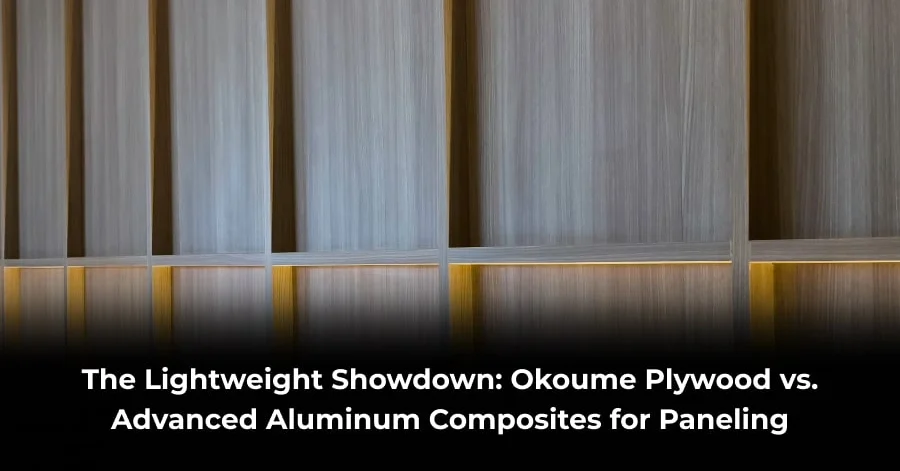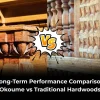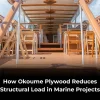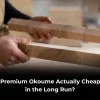When it comes to modern paneling solutions, industries such as marine, aviation, furniture, and premium interior design are constantly searching for materials that strike the perfect balance between lightweight strength, durability, flexibility, and cost-effectiveness. In this growing race for superior performance, Okoume Plywood and Advanced Aluminum Composites have become two top contenders—each offering its own strengths and limitations.
Whether you are a boat builder, a craftsman visiting a woodworking supplies store, or a designer evaluating paneling options for large-scale projects, understanding the true pros and cons of these two materials is essential. This blog breaks down everything you need to know about the Okoume Plywood vs. aluminum composite debate so you can make the best choice for your project.
Why Lightweight Paneling Matters More Than Ever
Weight plays a critical role in product performance and long-term maintenance, especially in industries where efficiency and fuel consumption matter. For marine and aviation builders, lightweight materials directly translate into better fuel efficiency, easier handling, and improved stability.
This is exactly why Okoume Plywood and aluminum composites have gained popularity in global markets. They offer lightweight construction without compromising structural integrity. But the big question remains: Which one performs better for real-world applications?
What Is Okoume Plywood?
Okoume Plywood is made from the Okoume tree (Aucoumea klaineana), a lightweight hardwood native to West Africa. Known for its smooth texture, excellent bendability, and natural durability, it is especially well-loved in the boat-building industry.
When manufactured for marine use, the result is okoume marine plywood, a premium-grade plywood designed to resist moisture, rot, and harsh weather conditions. Boat builders and marine engineers choose okoume marine plywood for its buoyancy, easy workability, and stunning natural grain—ideal for both aesthetic and performance-driven applications.
Many professionals order Okoume sheets through trusted suppliers or visit their preferred woodworking supplies store to find the right grades for their project needs.
What Are Advanced Aluminum Composites?
Advanced aluminum composite panels (ACPs) consist of two thin aluminum sheets bonded to a core material, often polyethylene or mineral-filled substrates. They are widely used in architectural cladding, signage, partitions, and transportation engineering.
Aluminum composites are popular for being lightweight, visually sleek, weather-resistant, and dimensionally stable. They are designed for long-term durability, especially in environments requiring fire resistance or UV protection.
Performance Comparison: Okoume Plywood vs. Aluminum Composites
To truly understand which material is better, we need to compare several performance factors.
1. Weight Efficiency
Okoume Plywood is one of the lightest hardwood plywood options available. Its density ranges around 430–450 kg/m³, making it ideal for applications requiring minimal weight load. The ease of handling is one reason many builders prefer buying okoume sheets from their local woodworking supplies store.
On the other hand, aluminum composites are also engineered to be lightweight, but depending on the core, they can sometimes be heavier than okoume marine plywood.
Winner: Okoume plywood, especially in marine-grade form.
2. Strength and Durability
Okoume marine plywood offers exceptional strength for its weight. It resists impact, distributes stress evenly, and withstands marine environments when properly sealed. It is naturally flexible, making it perfect for curved or custom panel designs.
Aluminum composites offer excellent dimensional stability and corrosion resistance. They do not warp when exposed to moisture and remain flat even under temperature fluctuations. However, aluminum can dent under impact, which may require replacement.
Winner: Tie — Okoume for impact resistance; Aluminum composites for structural rigidity.
3. Workability and Ease of Installation
Craftsmen love Okoume Plywood because it is easy to cut, bend, bond, and finish. Whether you are crafting boat interiors or building custom furniture, its flexibility gives unmatched creative freedom. This is why many continue purchasing okoume panels at their regular woodworking supplies store.
Aluminum composites require special tools for cutting, bending, and shaping. While installation is still manageable, it demands more specialized machinery and labor precision.
Winner: Okoume plywood.
4. Moisture and Weather Resistance
okoume marine plywood is engineered for moisture-rich environments. When sealed properly, it withstands water exposure for years. However, without proper sealing, plywood—even marine grade—can absorb moisture.
Aluminum composites are naturally weatherproof. They are corrosion-resistant and a preferred choice for exterior cladding.
Winner: Aluminum composites.
5. Aesthetics and Customization
Nothing beats the natural beauty of Okoume Plywood. Its smooth grain patterns allow for luxurious finishes, stains, or clear coatings. This makes okoume ideal for premium interiors, custom furniture, yacht interiors, and paneling requiring a warm, organic feel.
Aluminum composites offer modern aesthetics with clean lines and smooth, uniform colors. They can be coated in a variety of finishes, including metallics, mirrors, and textures.
Winner: Depends on your design preference — natural vs. modern.
6. Sustainability
Okoume is a renewable natural resource, especially when sourced from responsible suppliers. Plywood production has a lower carbon footprint compared to aluminum panel manufacturing.
Aluminum composites require significant energy during production and may generate more environmental impact. Recycling ACPs can also be challenging depending on the core.
Winner: Okoume plywood.
7. Cost Factor
Premium-grade okoume marine plywood is not the cheapest option, but it offers long-term value due to durability and longevity. Regular maintenance extends its lifespan significantly.
Aluminum composites may come with higher initial cost but offer low maintenance. However, dents or structural damage typically require complete panel replacement.
Winner: Depends on your project scale and maintenance expectations.
Final Verdict: Which Material Should You Choose?
Both materials are excellent choices—but for very different reasons.
Choose Okoume Plywood if:
- You value natural beauty.
- You need flexibility for curved surfaces.
- You require lightweight yet strong panels.
- You prefer sustainable, easy-to-work-with materials.
- You can conveniently get it from a trusted woodworking supplies store.
Choose Aluminum Composite Panels if:
- You want modern, sleek aesthetics.
- You need long-term exterior weather protection.
- You require maximum dimensional stability.
- You are working on architectural or industrial paneling.
For marine projects, interior paneling, custom furniture, and fine craftsmanship, okoume marine plywood remains unmatched. Its strength-to-weight ratio and natural finish continue to make it a favorite among builders and designers.
Conclusion
Both Okoume Plywood and Advanced Aluminum Composites have carved their own niche in the paneling industry. While aluminum composites shine in exterior durability and modern aesthetics, okoume marine plywood stands out for its natural appeal, flexibility, strength, and lightweight characteristics. Depending on your project, one may outperform the other—but Okoume remains the top choice for artisans, boat builders, and interior designers seeking quality and versatility.
If you’re looking for premium grades of Okoume or any other hardwood solutions, AEW Woods is the brand trusted by thousands of professionals. From marine timber to premium plywood sheets, AEW Woods ensures unmatched quality for every project.
Frequently Asked Questions:
- Is Okoume Plywood really better than aluminum composites for marine projects?
Yes. okoume marine plywood is specifically engineered for marine use. Its buoyancy, lightweight nature, and flexibility make it superior for boat interiors and structural applications.
- Can aluminum composites be used for interior furniture?
They can, but they are not commonly preferred. Most designers choose Okoume Plywood because it offers a warmer, more organic finish.
- Where can I buy authentic Okoume plywood?
You can source high-quality panels from a trusted woodworking supplies store or certified timber suppliers like AEW Woods.
- Is Okoume easy to work with?
Absolutely. Okoume Plywood is one of the easiest hardwood plywood options to cut, bend, and finish.
- Which is more cost-effective in the long run?
For interiors, boats, and furniture, okoume marine plywood offers better long-term value. For modern architecture, aluminum composites may offer lower maintenance costs.






